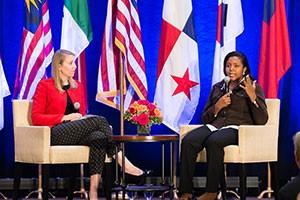Neema Minja, owner of Kebag Corporate Limited in Tanzania, and Anne Zaczek, manager of global development programs, spoke directly to U.S. Grains Council (USGC) delegates at the organization’s summer board meeting last week, offering a unique view of the impact USGC’s programs in that country have had on local producers.
The Food for Progress program, launched in 2014, offers regional support systems for Tanzanian feed producers and farmers with the goal of improving the quality of feed available to farmers and ultimately creating demand for coarse grains.
At the start of the program, USGC identified four measures of success:
- a self-sustaining feed quality lab that feed millers could use to test the quality of feed and ingredients;
- effective feed industry marketing programs to teach poultry producers about the advantages of quality feed and poultry production;
- viable poultry producer and feed manufacturer associations; and
- increased consumer confidence in the safety and quality of poultry, leading to increased consumption and expanded local production.
Today, all of these areas of work have shown notable successes, with a central lab providing reliable feed quality testing, the development of The national Poultry Association of Tanzania (PAT), and expanding extension worker training programs offered by major feed millers.
Minja traveled from her home country to the USGC meeting in Louisville, Kentucky, to offer a first-hand account of the progress and share the dramatic story of her own business’ growth.
Before participating in the program, Minja’s farm suffered several losses. She wasn’t able to produce at the rate she anticipated and found herself needing to purchase additional layers. Neema was fortunate to participate in the Council’s very first training seminar in August 2014 and her business has grown with the program since its start.
“I learned several production and management techniques. I came up with a business plan, ordered new chickens and began selling my eggs at supermarkets,” she said to the audience of more than 200 farmers and industry representatives.
After completing training and taking part in association discussions in Dar es Salaam, Minja was able to apply new techniques on her farm and increase her production percentage. Today, she has established a brand name that sets her eggs apart and, as one of the few distributors of yellow yolk eggs, she plans to buy a new farm to raise additional chickens and hopes to produce her own feed.
“There’s huge potential in Tanzania. Innovation is starting. Associations have become a platform for producers to discuss their issues and share skills and knowledge,” she said.
Zaczek, the USGC staff lead for the Tanzania program, facilitated the discussion with Minja, offering the audience a view of the program’s development from her perspective as well.
“It’s exciting to see how many new techniques have been adopted and applied. USGC was able to change the conversation about quality feed,” she said.
Following the Louisville meeting, Minja and Mary Ngalaba, USGC’s office manager in Tanzania, were able to visit two Kentucky farms, Fairfield Farms Poultry in Willisburg and McCoun Farm in Shelbyville, on side trips organized by the Kentucky Corn Promotion Council. This allowed them to get a direct look at production techniques commonly used in the United States and offered Minja several ideas she could implement on her own farm back in Tanzania.
To learn more about USGC’s Food For Progress program, click here


